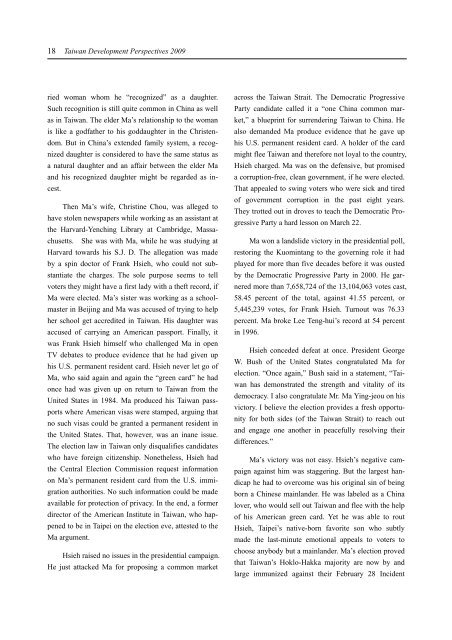PDF(2.7mb) - 國家政策研究基金會
PDF(2.7mb) - 國家政策研究基金會
PDF(2.7mb) - 國家政策研究基金會
You also want an ePaper? Increase the reach of your titles
YUMPU automatically turns print PDFs into web optimized ePapers that Google loves.
18 Taiwan Development Perspectives 2009<br />
ried woman whom he “recognized” as a daughter.<br />
Such recognition is still quite common in China as well<br />
as in Taiwan. The elder Ma’s relationship to the woman<br />
is like a godfather to his goddaughter in the Christendom.<br />
But in China’s extended family system, a recognized<br />
daughter is considered to have the same status as<br />
a natural daughter and an affair between the elder Ma<br />
and his recognized daughter might be regarded as incest.<br />
Then Ma’s wife, Christine Chou, was alleged to<br />
have stolen newspapers while working as an assistant at<br />
the Harvard-Yenching Library at Cambridge, Massachusetts.<br />
She was with Ma, while he was studying at<br />
Harvard towards his S.J. D. The allegation was made<br />
by a spin doctor of Frank Hsieh, who could not substantiate<br />
the charges. The sole purpose seems to tell<br />
voters they might have a first lady with a theft record, if<br />
Ma were elected. Ma’s sister was working as a schoolmaster<br />
in Beijing and Ma was accused of trying to help<br />
her school get accredited in Taiwan. His daughter was<br />
accused of carrying an American passport. Finally, it<br />
was Frank Hsieh himself who challenged Ma in open<br />
TV debates to produce evidence that he had given up<br />
his U.S. permanent resident card. Hsieh never let go of<br />
Ma, who said again and again the “green card” he had<br />
once had was given up on return to Taiwan from the<br />
United States in 1984. Ma produced his Taiwan passports<br />
where American visas were stamped, arguing that<br />
no such visas could be granted a permanent resident in<br />
the United States. That, however, was an inane issue.<br />
The election law in Taiwan only disqualifies candidates<br />
who have foreign citizenship. Nonetheless, Hsieh had<br />
the Central Election Commission request information<br />
on Ma’s permanent resident card from the U.S. immigration<br />
authorities. No such information could be made<br />
available for protection of privacy. In the end, a former<br />
director of the American Institute in Taiwan, who happened<br />
to be in Taipei on the election eve, attested to the<br />
Ma argument.<br />
Hsieh raised no issues in the presidential campaign.<br />
He just attacked Ma for proposing a common market<br />
across the Taiwan Strait. The Democratic Progressive<br />
Party candidate called it a “one China common market,”<br />
a blueprint for surrendering Taiwan to China. He<br />
also demanded Ma produce evidence that he gave up<br />
his U.S. permanent resident card. A holder of the card<br />
might flee Taiwan and therefore not loyal to the country,<br />
Hsieh charged. Ma was on the defensive, but promised<br />
a corruption-free, clean government, if he were elected.<br />
That appealed to swing voters who were sick and tired<br />
of government corruption in the past eight years.<br />
They trotted out in droves to teach the Democratic Progressive<br />
Party a hard lesson on March 22.<br />
Ma won a landslide victory in the presidential poll,<br />
restoring the Kuomintang to the governing role it had<br />
played for more than five decades before it was ousted<br />
by the Democratic Progressive Party in 2000. He garnered<br />
more than 7,658,724 of the 13,104,063 votes cast,<br />
58.45 percent of the total, against 41.55 percent, or<br />
5,445,239 votes, for Frank Hsieh. Turnout was 76.33<br />
percent. Ma broke Lee Teng-hui’s record at 54 percent<br />
in 1996.<br />
Hsieh conceded defeat at once. President George<br />
W. Bush of the United States congratulated Ma for<br />
election. “Once again,” Bush said in a statement, “Taiwan<br />
has demonstrated the strength and vitality of its<br />
democracy. I also congratulate Mr. Ma Ying-jeou on his<br />
victory. I believe the election provides a fresh opportunity<br />
for both sides (of the Taiwan Strait) to reach out<br />
and engage one another in peacefully resolving their<br />
differences.”<br />
Ma’s victory was not easy. Hsieh’s negative campaign<br />
against him was staggering. But the largest handicap<br />
he had to overcome was his original sin of being<br />
born a Chinese mainlander. He was labeled as a China<br />
lover, who would sell out Taiwan and flee with the help<br />
of his American green card. Yet he was able to rout<br />
Hsieh, Taipei’s native-born favorite son who subtly<br />
made the last-minute emotional appeals to voters to<br />
choose anybody but a mainlander. Ma’s election proved<br />
that Taiwan’s Hoklo-Hakka majority are now by and<br />
large immunized against their February 28 Incident

















